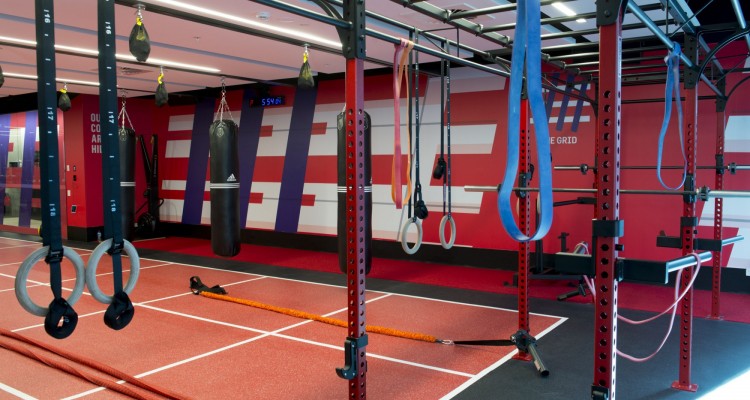Virgin Active is the first gym club to offer nutrition coaching alongside training to help members realise their New Year health and fitness goals. Our Editor here at Sydney Social 101 joined for a month to check it out for herself.
We were advised when we embarked on the month review that combining regular exercise and good nutritional practices makes gym-goers between three to ten times more likely to see results and achieve their goals[i] – and that’s why Virgin Active has teamed up with NA nutrition education program, Precision Nutrition (PN). Favoured by leading fitness professionals around the globe, PN complements the clubs’ world-class facilities, innovative classes and equipment with something equally tasty and innovative: nutrition coaching.
Free for new members and at an introductory price of only $75 for existing members who sign up until 28 February 2016, the Virgin Active PN nutrition coaching program includes a comprehensive nutrition manual with sections for at-home reading, teamed perfectly with two in-studio seminars provided by Virgin Active’s nutrition certified coaches. Members can book themselves into a 30 day fitness planning session with a trainer, kicking their new nutrition and fitness knowledge into action. Up to five Virgin Active trainers per club will be certified as a level 1 Nutrition Coach through the PN training program – a qualification recognised and approved by Fitness Australia – plus they will be able to offer 1:1 Nutrition Coaching to complement personal training should members require more personalised attention.
We caught up with Professor, instructor and PN program creator Dr Krista Scott-Dixon to find out more about he program and her advice first hand:
Q&A with Dr Krista Scott Dixon, Precision Nutrition
Tell us about the importance of eating well when trying to lose weight.
To lose weight, we have to create a negative energy balance. This means taking in less energy (in the form of food) than we expend (in the form of activity, or just doing the daily bodily tasks of staying alive, which are collectively known as metabolism).
We can help create a negative energy balance, or energy deficit, by becoming more active. And this is a great first step, which many folks at Virgin Active are already doing well.
The other huge benefit to eating well is that good nutrition is essential for all physiological functions. We need good nutrition for everything in our bodies, such as:
- Brain function, cognition, learning, memory
- Mood and emotions
- Immunity and recovery
- Energy production
- Hormonal health
- Building and maintaining muscle and other lean tissues, including bone and connective tissues (e.g. cartilage, ligaments, tendons, etc.)
It is important to focus on quantity as well as quality. Also, focusing on what we are choosing to add – the quality and value we are giving our bodies to nourish it – will keep us positive rather than feeling deprived. Good nutrition helps us feel like we are doing a positive thing for ourselves.
Is a little bit of what you love (i.e. pizza, chocolate) ok?
Of course.
The key is really:
- Choose the best versions of what you love. Invest in quality. Don’t eat crappy frozen pizza – go out and enjoy an amazing wood-fired pizza. If you love chocolate, buy expensive high-end chocolate
- Eat your food – all food – slowly and mindfully. Savour it like a fine wine. Many people say “I love food X” but they still rush through that food. If you love that food, spend some quality time with it and be present with it. You’ll find you enjoy it more and need less of it
- Be honest and real about what “occasional” or “a little bit” is. Chocolate at every meal may not be realistic – although I do know people who can and will eat a small square of dark chocolate at nearly every meal. Most people aren’t like that. Most people selectively remember how often and how much of their favourite foods they eat, so they assume they don’t eat a lot when in reality they are “treating” themselves constantly
What’s an example of a good meal plan for one day?
It’s hard to give specifics, since individual food preferences and needs vary so much. But here’s a day of eating using the Precision Nutrition-style meal template for an average woman, which is:
- About 1 palm-sized portion of protein
- About 1 cupped handful (or ½ fist) of slow-digesting, nutrient-rich carbohydrates
- About 1 thumb fat
- About 1 fist of colourful vegetables or colourful fruit
Meal 1 – 7 AM
- Cottage cheese and blueberries with a bowl of slow-cooked oats; a sprinkle of chopped nuts on top
Meal 2 – 10 AM
SuperShake – something perfect for on-the-go
- 1 scoop of protein powder or maybe strained Greek yogurt for the protein
- A few handfuls of spinach (you can’t taste this in a shake, it’s grand)
- ¼ avocado (likewise, it adds creamy texture but you don’t taste it)
- A handful of fruit such as mango or pineapple
- Maybe a tiny bit of honey to sweeten it, if needed
All blended up into a nice smoothie, best to prepare this in the morning so it is on hand for when it’s time to run.
Meal 3 – 2:30 PM
The mid-afternoon snack attack
- A small container of hummus
- Some cut-up veggies (e.g. baby carrots, capsicums, cucumber, sugar snap peas, etc.) or fruit (maybe an apple)
- A few raw nuts (e.g. almonds, cashews, Brazil nuts, walnuts, etc.)
Meal 4 – 6 PM
A nice sit-down dinner.
- About a palm-sized portion of broiled salmon
- A nice big salad loaded with all kinds of delicious fresh veggies
- Olive oil dressing
- About a cupped handful of high-fibre whole grains on top (e.g. quinoa, wild or brown rice, millet, etc.)
What are the foods to avoid?
Nothing. Unless you’re allergic or intolerant to them. Or have some ethical, cultural, or religious reason not to eat them (e.g. if you’re kosher or halal).
For instance, if you drink a lot of coffee and you have a big crash or stuffy nose when you drink red wine or drink milk, you might want to cut down on these foods.
Which foods are a nutritionist’s dream?
Anything that adds value and nourishment and provides us with vitamins, minerals, healthy fats, protein, phytonutrients (plant chemicals), fibre and other slow-digesting, microbiome-friendly forms of carbohydrate (such as pectin or resistant starch), antioxidants, etc. Along with actually tasting good and being versatile in a number of cuisines of course!
These can be foods like:
- Leafy greens and other “salad reds” like radicchio, red leaf lettuce, or purple cabbage
- Oily fish like salmon
- Raw nuts and seeds
- Dark coloured berries
- Strong smelling foods like onion, garlic, and fresh herbs – the smell indicates volatile chemicals that do all kinds of cool things like anti-microbial, anti-viral, anti-bacterial activities
- Pastured meats (e.g. pastured lamb, beef) – kangaroo and emu are actually great choices!
- Beans and legumes like lentils, chick peas / garbanzo beans, etc.
- Whole, minimally processed grains like brown or wild rice, quinoa, amaranth, millet, buckwheat, teff, steel-cut or whole oats, barley, etc.
- Tubers like orange sweet potatoes or even the humble plain potato – a very under-rated food in terms of nutritional value
Tell us more about the program
Virgin Active knows that when it comes to results, making healthy choices is the secret to success. Combining regular exercise and good nutritional practices makes gym-goers between three to ten times more likely to see results and achieve their goals[i] – that’s why Virgin Active has teamed up with North American nutrition education program, Precision Nutrition. Favoured by leading fitness professionals around the globe, Precision Nutrition complements the clubs’ world-class facilities, innovative classes and equipment with something equally tasty and innovative: nutrition coaching.
The Virgin Active Nutrition Coaching program includes a comprehensive nutrition manual with sections for at-home reading, teamed perfectly with two in-studio seminars provided by Virgin Active’s nutrition-certified coaches. Members can book themselves into a 30 day fitness planning session with a trainer, kicking their new nutrition and fitness knowledge into action. Up to five Virgin Active trainers per club will be certified as a level 1 Nutrition Coach through the Precision Nutrition training program (recognised and approved by Fitness Australia), plus they will be able to offer 1:1 nutrition coaching to complement personal training should members require more personalised attention.
Precision Nutrition is a way of thinking about food and eating that is habit-based, simple, sequential (step by step), and systematic. We offer lots of options for tailoring the basic eating concepts, such as how to structure your diet if you’re a plant-based eater, or extremely active, or have food sensitivities, etc. This is why the partnership with Virgin Active is the perfect fit – it means that members now have an even better chance of reaching their fitness goals than ever before.
For more information, visit www.virginactive.com.au
[i] Precision Nutrition base of 40,000 people


Leave a Reply